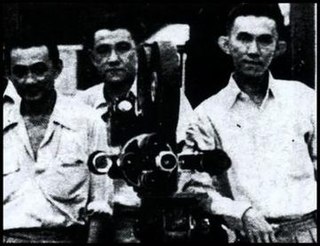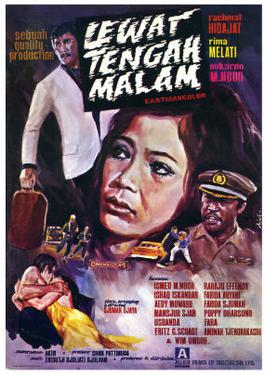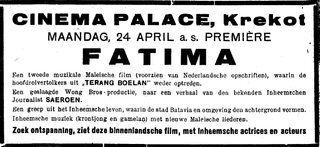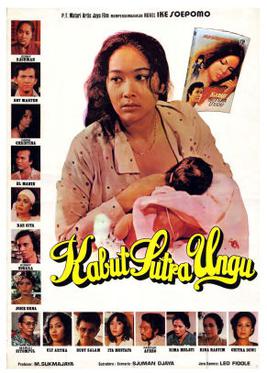Plot
Fatima (Jenny Rachman) offers herself to be brought away by Japanese occupation forces to save her of her daughter, thus resigning herself to the fate of a comfort woman. She is one of hundreds of women sent from the Dutch East Indies (now Indonesia) to Japanese-occupied British Malaya and forced to work in a brothel. There she meets Takashi (El Manik), a kindly Japanese commander who falls in love with her. Fatima moves in with him, which protects her from the other men.
Meanwhile, Fatima works with the local rebels and helps them capture the military base. The prisoners are freed. Takashi, meanwhile, discovers Fatima's betrayal and releases her before committing suicide. Although she is able to escape the base, Fatima is not allowed to join the rebels, having caught syphilis while at the brothel. As she makes her way back to the Indies, which has since proclaimed its independence, Fatima's ship is captured by Dutch soldiers from the Netherlands Indies Civil Administration (NICA).
Fatima is forced to work in a NICA brothel for the remainder of the Indonesian National Revolution, although she remains combative. After the revolution, Fatima is released into poverty and over the years finds that even Indonesians misuse her. She falls ill and is brought to a hospital, where she is treated by the daughter she had left years earlier, now a doctor. The aged Fatima soon leaves the hospital and wanders about, looking at the neon signs advertising Japanese products.
Production
Budak Nafsu was directed by Sjumandjaja. He had been raised in Batavia (modern day Jakarta) during the Japanese occupation, and when the Japanese were expanding the Kemayoran Airport, he witnessed several forced labourers being beaten to death. He adapted Budak Nafsu from the novel Fatima (1981) by Titie Said; he had initially planned on keeping the original title, and the film has also been released as Fatima.
The film starred Jenny Rachman in the leading female role of Fatima and El Manik as Takadeshi. More minor roles were taken by Sofia WD, Roy Marten, and Maruli Sitompul. Many of these actors had previous experience with the director. Sjumandjaja also had a cameo. According to El Manik, on one occasion the actor expressed concern that a Japanese commander would be unable to speak Indonesian fluently, as Sjumandjaja's screenplay called for, and that there should be Japanese-language dialogue. Sjumandjaja told him to write the dialogue himself if he wanted. [4]
The crew included Norman Benny as editor, Soetomo Gandasubrata as cinematographer, and Djufri Tanissan as artistic director; music was provided by Idris Sardi.Budak Nafsu was the first film produced by Raam Lalchand Pridhani (credited as Ram Soraya) and his Soraya Intercine Film. [5]
Emmanuel Ginting Manik or better known as El Manik is an Indonesian actor of Karo descent.

Sjumandjaja was an Indonesian director, screenwriter, and actor. During his career he wrote numerous films, directed fourteen, acted in ten, and produced nine; he also won five Citra Awards from the Indonesian Film Festival. His films reflected social realism.
Melati van Agam is a 1931 romance film directed by Lie Tek Swie and produced by Tan's Film. Starring A. Rachman, Neng Titi, Oemar, and Bachtiar Effendi, the two-part film follows the young lovers Norma and Idrus. The film, which may be lost, was reportedly a commercial success, but critical reviews were less favourable.

The Wong brothers were three ethnic Chinese film directors and cameramen active in the cinema of the Dutch East Indies. The sons of an Adventist preacher, the brothers – Nelson (1895–1945), Joshua (1906–1981), and Othniel (1908–1986) – received much of their education in the United States before going to Shanghai and establishing The Great Wall Productions.

Roekihati is a 1940 film from the Dutch East Indies. Directed by the brothers Joshua and Othniel Wong and produced by Tan's Film, it follows a young village woman who goes to the city and encounters various difficulties. Targeted at lower-class audiences, it was shot in black-and-white and starred Roekiah and Raden Djoemala.

Siti Akbari is a 1940 film from the Dutch East Indies directed by Joshua and Othniel Wong and produced by Tan Khoen Yauw. Starring Roekiah and Rd Mochtar, it follows a couple while the husband commits adultery.

Lewat Tengah Malam is a 1971 Indonesian film and the first feature-length production by director Sjumandjaja. Starring Rachmat Hidayat, Rima Melati, and Soekarno M. Noer, it follows a thief named Lono who steals from the corrupt to give to the poor. The film, which may have been influenced by The Thomas Crown Affair (1968), was reportedly very tiring for the director, who briefly considered never directing again. The social realist elements led to Suharto's New Order government keeping Sjumandjaja under surveillance.
Salah Asuhan is a 1972 film directed by Asrul Sani, produced by Andy Azhar, and starring Dicky Zulkarnaen, Ruth Pelupessy, and Rima Melati. Adapted from Abdoel Moeis' 1928 novel of the same name, it tells of a man who betrays his upbringing for the metropolitan life, while at the same time marrying an Indo woman instead of the one chosen by his mother.
Sam Pek Eng Tay is a 1931 film directed and produced by The Teng Chun and released in the Dutch East Indies. It is based on the Chinese legend The Butterfly Lovers, which follows the doomed love between a rich girl and a commoner boy. The film was a commercial success, inspiring The Teng Chun to direct several further films based on Chinese mythology. The name derives from the given names of the legend's two main characters, Liang Shanbo (梁山伯) and Zhu Yingtai (祝英台).

Pengkhianatan G30S/PKI is a 1984 Indonesian docudrama co-written and directed by Arifin C. Noer, produced by G. Dwipayana, and starring Amoroso Katamsi, Umar Kayam, and Syubah Asa. Produced over a period of two years with a budget of Rp. 800 million, the film was sponsored by Suharto's New Order government. It was based on an official history of the 30 September Movement coup in 1965 written by Nugroho Notosusanto and Ismail Saleh, which depicted the coup as being orchestrated by the Communist Party of Indonesia.

Serangan Fajar is a 1982 Indonesian war film directed by Arifin C. Noer and produced by G. Dwipayana. Telling the lives of several persons during the Indonesian National Revolution, the film used wayang imagery to show heroism. The critically acclaimed film has been read as emphasising then-President Suharto's role in the revolution, especially the General Offensive of 1 March.

Darah dan Doa is a 1950 Indonesian war film directed and produced by Usmar Ismail, telling the story of the Siliwangi Division and its leader Captain Sudarto on a march to West Java. Following Ismail's Dutch-produced Tjitra (1949), Darah dan Doa is often cited as the first 'Indonesian' film, and the film's first day of shooting – 30 March – is celebrated in Indonesia as National Film Day.

Fatima is a 1938 film from the Dutch East Indies directed by Othniel and Joshua Wong. Written by Saeroen, it starred Roekiah, Rd Mochtar, and ET Effendi and followed two lovers who are disturbed by a rich youth. The film followed the same formula as the earlier hit Terang Boelan, and saw commercial success domestically. It is one of three films which Misbach Yusa Biran credits with reviving the domestic film industry, which had been faltering.

Ponirah Terpidana is a 1984 Indonesian drama film directed by Slamet Rahardjo. Starring Nani Vidia, Rahardjo, and Ray Sahetapy, it follows a young woman named Ponirah who becomes a prostitute and is arrested for the murder of a rich businessman. The film, which combined traditional and contemporary elements, was a critical success in Indonesia. It won three Citra Awards at the 1984 Indonesian Film Festival, from a total of eleven nominations.

Kabut Sutra Ungu is a 1979 Indonesian film directed by Sjumandjaja and starring Jenny Rachman, Roy Marten, and El Manik. Adopted from the novel of the same name by Ike Soepomo, it follows a young widow who must overcome various obstacles before marrying again.
Raam Lalchand Pridhani, better known as Raam Soraya or Ram Soraya, is an entrepreneur and film producer from Indonesia. He is the owner of production house Soraya Intercine Films. He was born in an Indian-Indonesian (Sindhi) family in Surabaya, Indonesia on 4 November 1949.
Sorga Palsoe is a 1941 film from the Dutch East Indies which was directed by Tan Tjoei Hock for Java Industrial Film. The tragedy, starring Lo Tjin Nio, Tong Hui, Lim Poen Tjiaw, and Rohana, was a commercial failure. It is likely lost.
Poetri Rimba is a 1941 film from the Dutch East Indies which was directed by Inoe Perbatasari and produced by The Teng Chun for Jacatra Film. A love story, it tells of a man who rescues a woman from a gang of thieves and escapes through the jungle.
Djaoeh Dimata is a 1948 film from what is now Indonesia written and directed by Andjar Asmara for the South Pacific Film Corporation (SPFC). Starring Ratna Asmara and Ali Joego, it follows a woman who moves to Jakarta to find work after her husband is blinded in an accident. SPFC's first production, Djaoeh Dimata took two to three months to film and cost almost 130,000 gulden.

Bengawan Solo is a now-lost 1949 film from what is now Indonesia. Directed by Jo An Djan, it starred Sofia WD, Rd Mochtar, and Mohamad Mochtar.












